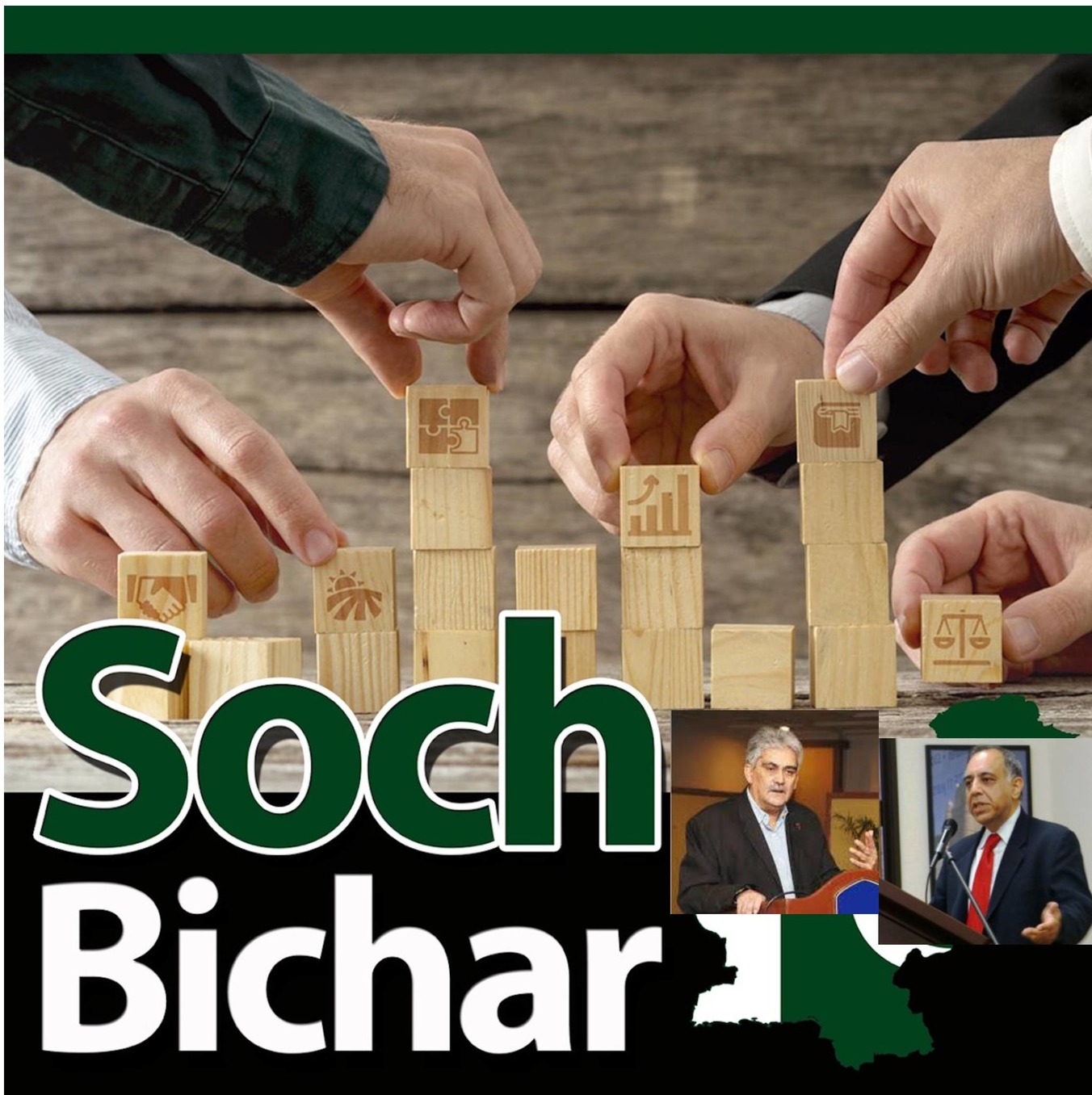
71.3K
Downloads
272
Episodes
Conversations on issues of development policy in Pakistan and the rest of South Asia. Political economy subjects that are seldom featured in the media will be taken up.
Conversations on issues of development policy in Pakistan and the rest of South Asia. Political economy subjects that are seldom featured in the media will be taken up.
Episodes
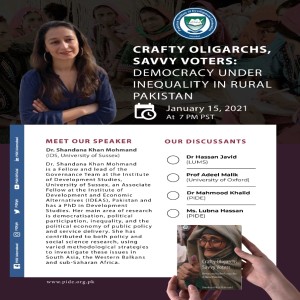
Thursday Jan 21, 2021
Crafty Oligarchs, Savvy Voters: Democracy Under Inequality in Rural Pakistan
Thursday Jan 21, 2021
Thursday Jan 21, 2021
Moderator:
Dr. Nadeem ul Haque, VC PIDE
Speaker:
Dr. Shandana Khan Mohmand, Book Author
About the Author:
Her work in this area focuses on questions of representation, accountability, and responsiveness, and takes a political economy approach to the analysis of local government and service provision in the Western Balkans, South Asia, and Africa.
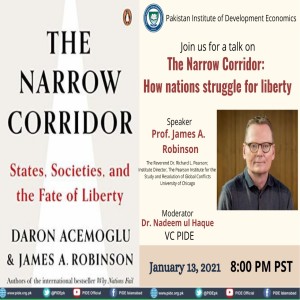
Friday Jan 15, 2021
Talk on "The Narrow Corridor: How Nations Struggle for Liberty"
Friday Jan 15, 2021
Friday Jan 15, 2021
Wednesday, January 13, 2020 at 8:00 PM (PST)
Moderator: Dr. Nadeem ul Haque (VC, PIDE)
Speaker: Prof. James A. Robinson
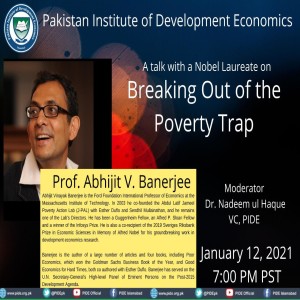
Wednesday Jan 13, 2021
Breaking Out of Poverty Trap, Nobel Laureate Prof. Abhijeet Banerjee
Wednesday Jan 13, 2021
Wednesday Jan 13, 2021
Tuesday, January 12, 2020 at 7:00 PM (PST)
Moderator: Dr. Nadeem ul Haque, VC PIDE
Speaker: Prof. Abhijit V. Banerjee
About Speaker:
Professor Banerjee is the recipient of the 2019 Sveriges Riksbank Prize in Economic Sciences in Memory of Alfred Nobel, awarded jointly with Esther Duflo and Michael Kremer "for their experimental approach to alleviating global poverty." Banerjee is a past president of the Bureau for the Research in the Economic Analysis of Development, a Research Associate of the NBER, a CEPR research fellow, International Research Fellow of the Kiel Institute, a fellow of the American Academy of Arts and Sciences and the Econometric Society and has been a Guggenheim Fellow and an Alfred P. Sloan Fellow. Professor Banerjee received the Infosys Prize 2009 in Social Sciences and Economics. In 2011, he was named one of Foreign Policy magazine's top 100 global thinkers. His areas of research are development economics and economic theory. Banerjee is a member of J-PAL's Executive Committee and previously served as co-chair of J-PAL’s Education Sector.
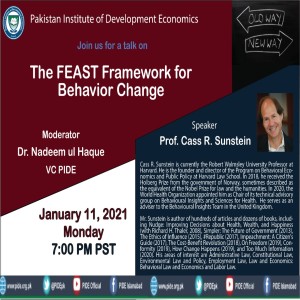
Tuesday Jan 12, 2021
Talk on "The FEAST Framework for Behavior Change"
Tuesday Jan 12, 2021
Tuesday Jan 12, 2021
Monday, January 11, 2020 at 7:00 PM (PST)
Moderator: Dr. Nadeem ul Haque (VC. PIDE)
Speaker: Prof. Cass R. Sunstein
About Speaker:
Cass R. Sunstein is currently the Robert Walmsley University Professor at Harvard. He is the founder and director of the Program on Behavioral Economics and Public Policy at Harvard Law School. In 2018, he received the Holberg Prize from the government of Norway, sometimes described as the equivalent of the Nobel Prize for law and the humanities. In 2020, the World Health Organization appointed him as Chair of its technical advisory group on Behavioural Insights and Sciences for Health. From 2009 to 2012, he was Administrator of the White House Office of Information and Regulatory Affairs, and after that, he served on the President's Review Board on Intelligence and Communications Technologies and on the Pentagon's Defense Innovation Board. Mr. Sunstein has testified before congressional committees on many subjects, and he has advised officials at the United Nations, the European Commission, the World Bank, and many nations on issues of law and public policy. He serves as an adviser to the Behavioral Insights Team in the United Kingdom.

Thursday Dec 31, 2020
Grand National (Intellectual) Dialogue (For Reform) in Pakistan, Day-5, 29-12-2020
Thursday Dec 31, 2020
Thursday Dec 31, 2020
Moderator: Dr Nadeem ul Haq (VC. PIDE)
Panelists/Speakers
Zarar Khuhro (Senior Journalist and Hots of Zara Hut Kay)
Amer Zafar Durrani (President, Reenergia)
Zaigham Khan (Executive Director, Civic Action Resources)
Omar Quraishi (Journalist and CEO, Positive Media Communications)
Usman Raza Jolaha (Founder/President, Volunteer Force Pakistan)
There is talk of a Grand National Dialog in Pakistan. In the past, such initiatives have led to APCs that have mainly tried to strengthen political cartels. Reform for changing the way we do business of politics and policy is conveniently never in the agenda.
We at PIDE are proposing a Grand National (intellectual) dialog on reform to parallel and possibly lead the possible GND with ideas.
PIDE questions to our intellectuals will be:
1. Is democracy working as it should?
2. Can the system be improved through reform? What would you suggest!
3. Can the clash of institutions be avoided through reform?
4.Parliament virtually becomes irrelevant after elections! Attendance rates are low and legislative efforts very limited. Debates on bills infrequent. Even the budget is not debated adequately. Competence of parliamentarians to take on complex legislative issues too remains in question.
5. Democrats don’t want local government. Can the constitution be democratic w/o local government? MNAs, MPAs are running after development funds and involved in local admin.
6.The executive thrives in extreme centralization. All regulatory agencies PSEs universities are not granted autonomy.
7.Judiciary often wants to play the role of the executive while commercial and other disputes wait for decades to be sorted out. Precedents clearly are not adhered to and the speed of justice is very slow.
8. 1 election every 5 years enables a government to establish absolute rule leaving opposition and others frantic for a role.
9. Dynastic politics or the control of the constituencies by families has almost developed “rotten boroughs”. What sort of electoral reform can bring in more electoral competition?
There are many issues for intellectuals to take up. Theses should be written on these issues to light our way to a better system.
The usual binaries— civil military and presidential vs parliamentary- prevent the focus from being placed on improving our current system. We would like to spotlight the failings of our current system that derives from colonialism. Can we reform it?
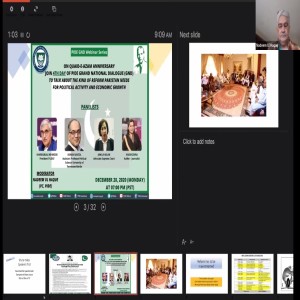
Thursday Dec 31, 2020
Grand National (Intellectual) Dialogue (For Reform) in Pakistan, Day-4, 28-12-2020
Thursday Dec 31, 2020
Thursday Dec 31, 2020
Monday, December 28, 2020 at 07:00 PM (PST)
Moderator: Dr Nadeem ul Haq (VC. PIDE)
Panelists/Speakers
Mr. Ahmed Bilal Mehboob (President PILDAT)
Dr. Adnan Rasool (Assistant Professor Political Science- University of Tennessee-Martin )
Ms. Jamila Aslam (Advocate Supreme Court) ,
Ms. Nasim Zehra (Journalist)
There is talk of a Grand National Dialog in Pakistan. In the past, such initiatives have led to APCs that have mainly tried to strengthen political cartels. Reform for changing the way we do business of politics and policy is conveniently never in the agenda.
We at PIDE are proposing a Grand National (intellectual) dialog on reform to parallel and possibly lead the possible GND with ideas.
PIDE questions to our intellectuals will be:
1. Is democracy working as it should?
2. Can the system be improved through reform? What would you suggest!
3. Can the clash of institutions be avoided through reform?
4.Parliament virtually becomes irrelevant after elections! Attendance rates are low and legislative efforts very limited. Debates on bills infrequent. Even the budget is not debated adequately. Competence of parliamentarians to take on complex legislative issues too remains in question.
5. Democrats don’t want local government. Can the constitution be democratic w/o local government? MNAs, MPAs are running after development funds and involved in local admin.
6.The executive thrives in extreme centralization. All regulatory agencies PSEs universities are not granted autonomy.
7.Judiciary often wants to play the role of the executive while commercial and other disputes wait for decades to be sorted out. Precedents clearly are not adhered to and the speed of justice is very slow.
8. 1 election every 5 years enables a government to establish absolute rule leaving opposition and others frantic for a role.
9. Dynastic politics or the control of the constituencies by families has almost developed “rotten boroughs”. What sort of electoral reform can bring in more electoral competition?
There are many issues for intellectuals to take up. Theses should be written on these issues to light our way to a better system.
The usual binaries— civil military and presidential vs parliamentary- prevent the focus from being placed on improving our current system. We would like to spotlight the failings of our current system that derives from colonialism. Can we reform it?
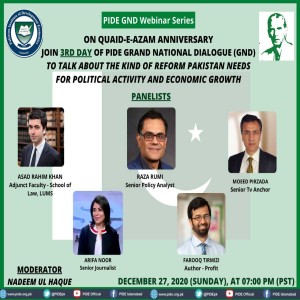
Wednesday Dec 30, 2020
Grand National (Intellectual) Dialogue (For Reform) in Pakistan, Day-3, 27-12-2020
Wednesday Dec 30, 2020
Wednesday Dec 30, 2020
Moderator: Dr Nadeem ul Haq (VC. PIDE)
Panelists/Speakers
Mr. Asad Rahim (Adjunct Faculty - School of Law )
Mr. Raza Rumi (Policy Analyst)
Ms. Arifa Noor (Journalist), Mr.Farooq Tirmizi (Author-Profit)
Mr. Moeed Pirzada (Senior Journalist, Analyst)
Mr. Farooq Tirmzi (Author - Profit)
Description:
We at PIDE are proposing a Grand National (intellectual) dialog on reform to parallel and possibly lead the possible GND with ideas.
There is talk of a Grand National Dialog in Pakistan. In the past, such initiatives have led to APCs that have mainly tried to strengthen political cartels. Reform for changing the way we do business of politics and policy is conveniently never in the agenda.
PIDE questions to our intellectuals will be:
1. Is democracy working as it should?
2. Can the system be improved through reform? What would you suggest!
3. Can the clash of institutions be avoided through reform?
4.Parliament virtually becomes irrelevant after elections! Attendance rates are low and legislative efforts very limited. Debates on bills infrequent. Even the budget is not debated adequately. Competence of parliamentarians to take on complex legislative issues too remains in question.
5. Democrats don’t want local government. Can the constitution be democratic w/o local government? MNAs, MPAs are running after development funds and involved in local admin.
6.The executive thrives in extreme centralization. All regulatory agencies PSEs universities are not granted autonomy.
7.Judiciary often wants to play the role of the executive while commercial and other disputes wait for decades to be sorted out. Precedents clearly are not adhered to and the speed of justice is very slow.
8. 1 election every 5 years enables a government to establish absolute rule leaving opposition and others frantic for a role.
9. Dynastic politics or the control of the constituencies by families has almost developed “rotten boroughs”. What sort of electoral reform can bring in more electoral competition?
There are many issues for intellectuals to take up. Theses should be written on these issues to light our way to a better system.
The usual binaries— civil military and presidential vs parliamentary- prevent the focus from being placed on improving our current system. We would like to spotlight the failings of our current system that derives from colonialism. Can we reform it?
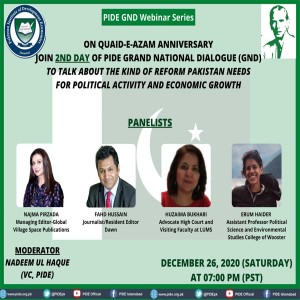
Wednesday Dec 30, 2020
Grand National (Intellectual) Dialogue (For Reform) in Pakistan, Day-2
Wednesday Dec 30, 2020
Wednesday Dec 30, 2020
Moderator: Dr Nadeem ul Haq (VC. PIDE)
Panelists/Speakers
Ms. Najma Pirzada (Managing Editor-Global Village Space Publications )
Mr. Fahd Hussain (Journalist/Resident Editor Dawn )
Dr.Erum Haider (Assistant Professor Political Science and Environmental Studies College of Wooster OH)
Ms. Huzaima Bukhari (Advocate High Court and Visiting Faculty at LUMS)
Description:
There is talk of a Grand National Dialog in Pakistan. In the past, such initiatives have led to APCs that have mainly tried to strengthen political cartels. Reform for changing the way we do business of politics and policy is conveniently never in the agenda.
We at PIDE are proposing a Grand National (intellectual) dialog on reform to parallel and possibly lead the possible GND with ideas.
PIDE questions to our intellectuals will be:
1. Is democracy working as it should?
2. Can the system be improved through reform? What would you suggest!
3. Can the clash of institutions be avoided through reform?
4.Parliament virtually becomes irrelevant after elections! Attendance rates are low and legislative efforts very limited. Debates on bills infrequent. Even the budget is not debated adequately. Competence of parliamentarians to take on complex legislative issues too remains in question.
5. Democrats don’t want local government. Can the constitution be democratic w/o local government? MNAs, MPAs are running after development funds and involved in local admin.
6.The executive thrives in extreme centralization. All regulatory agencies PSEs universities are not granted autonomy.
7.Judiciary often wants to play the role of the executive while commercial and other disputes wait for decades to be sorted out. Precedents clearly are not adhered to and the speed of justice is very slow.
8. 1 election every 5 years enables a government to establish absolute rule leaving opposition and others frantic for a role.
9. Dynastic politics or the control of the constituencies by families has almost developed “rotten boroughs”. What sort of electoral reform can bring in more electoral competition?
There are many issues for intellectuals to take up. Theses should be written on these issues to light our way to a better system.
The usual binaries— civil military and presidential vs parliamentary- prevent the focus from being placed on improving our current system. We would like to spotlight the failings of our current system that derives from colonialism. Can we reform it?
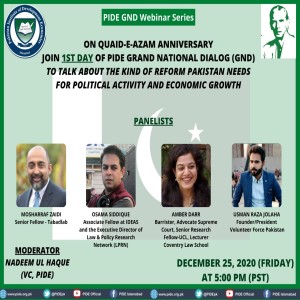
Wednesday Dec 30, 2020
Grand National (Intellectual) Dialogue (For Reform) in Pakistan, Day-1
Wednesday Dec 30, 2020
Wednesday Dec 30, 2020
Moderator: Dr Nadeem ul Haq (VC. PIDE)
Panelists/Speakers:
Mosharraf Zaidi (Senior Fellow-Tabadlab)
Osama Siddique (Associate Fellow at IDEAS and the Executive Director of Law & Policy Research Network (LPRN))
Amber Darr (Barrister, Advocate Supreme Court, Senior Research Fellow-UCL, Lecturer Coventry Law School)
Usman Raza Jolaha, Founder/President, Volunteer Force Pakistan
There is talk of a Grand National Dialog in Pakistan. In the past, such initiatives have led to APCs that have mainly tried to strengthen political cartels. Reform for changing the way we do business of politics and policy is conveniently never in the agenda.
We at PIDE are proposing a Grand National (intellectual) dialog on reform to parallel and possibly lead the possible GND with ideas.
PIDE questions to our intellectuals will be:
1. Is democracy working as it should?
2. Can the system be improved through reform? What would you suggest!
3. Can the clash of institutions be avoided through reform?
4.Parliament virtually becomes irrelevant after elections! Attendance rates are low and legislative efforts very limited. Debates on bills infrequent. Even the budget is not debated adequately. Competence of parliamentarians to take on complex legislative issues too remains in question.
5. Democrats don’t want local government. Can the constitution be democratic w/o local government? MNAs, MPAs are running after development funds and involved in local admin.
6.The executive thrives in extreme centralization. All regulatory agencies PSEs universities are not granted autonomy.
7.Judiciary often wants to play the role of the executive while commercial and other disputes wait for decades to be sorted out. Precedents clearly are not adhered to and the speed of justice is very slow.
8. 1 election every 5 years enables a government to establish absolute rule leaving opposition and others frantic for a role.
9. Dynastic politics or the control of the constituencies by families has almost developed “rotten boroughs”. What sort of electoral reform can bring in more electoral competition?
There are many issues for intellectuals to take up. Theses should be written on these issues to light our way to a better system.
The usual binaries— civil military and presidential vs parliamentary- prevent the focus from being placed on improving our current system. We would like to spotlight the failings of our current system that derives from colonialism. Can we reform it?
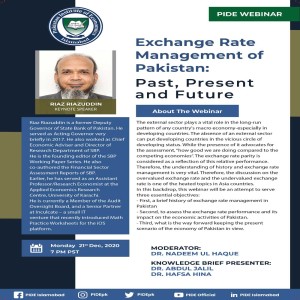
Tuesday Dec 22, 2020
Exchange rate management of Pakistan: Past, Present and Future
Tuesday Dec 22, 2020
Tuesday Dec 22, 2020
Key Note Speaker: Riaz Riazuddin
Moderator: Dr. Nadeem ul Haque
Knowledge Brief Presenters: Abdul Jalil and Hafsa Hina
Riaz Riazuddin is a former Deputy Governor of State Bank of Pakistan. He served as Acting Governor very briefly in 2017. He also worked as Chief Economic Adviser and Director of Research Department of SBP. He is the founding editor of the SBP Working Paper Series. He also co-authored the Financial Sector Assessment Reports of SBP.
Earlier, he has served as an Assistant Professor/Research Economist at the Applied Economics Research Centre, University of Karachi.
He is currently a Member of the Audit Oversight Board, and a Senior Partner at Inculcate – a small IT venture that recently introduced Math Practice Worksheets for the iOS platform.
The external sector plays a vital role in the long-run pattern of any country's macro economy-especially in developing countries. The absence of an external sector can put developing countries in the vicious circle of developing status. While the presence of it advocates for the assessment, “how good we are doing compared to the competing economies”. The exchange rate parity is considered as a reflection of this relative performance. Therefore, the understanding of history and exchange rate management is very vital. Therefore, the discussion on the overvalued exchange rate and the undervalued exchange rate is one of the heated topics in Asia countries.
In this backdrop, this webinar will be an attempt to serve three essential objectives:
First, a brief history of exchange rate management in Pakistan
Second, to assess the exchange rate performance and its impact on the economic activities of Pakistan.
Third, what is the way forward keeping the present scenario of the economy of Pakistan in view.
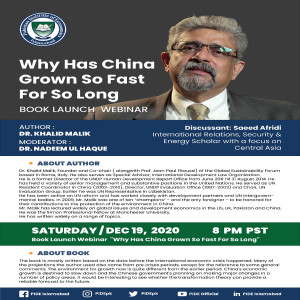
Monday Dec 21, 2020
Why has China grown so fast for so long
Monday Dec 21, 2020
Monday Dec 21, 2020
Dr. Khalid Malik, Founder and Co-chair (alongwith Prof. Jean Paul Fitoussi) of the Global Sustainability Forum based in Rome, Italy. He also serves as Special Advisor, International Development Law Organization.
He is a former Director of the UNDP Human Development Report Office from June 2011 till 31 August 2014. He has held a variety of senior management and substantive positions in the United Nations. He served as UN Resident Coordinator in China (2003–2010), Director, UNDP Evaluation Office (1997-2003) and Chair, UN Evaluation Group. Earlier he was UN Representative in Uzbekistan.
He has been active on UN reform and has worked closely with development partners and UN intergovernmental bodies. In 2009, Mr. Malik was one of ten “champions” - and the only foreigner - to be honored for their contributions to the protection of the environment in China.
Mr. Malik has lectured widely on global issues and development economics in the US, UK, Pakistan and China. He was the Simon Professional Fellow at Manchester University.
He has written widely on a range of topics.
His book "Why China Has Grown So Fast for So Long" was published in 2012 by Oxford University Press and translated into Chinese in 2019 by Renmin University Press.
Earlier, he co-edited “Capacity for Development: New Solutions to Old Problems” (2002), and Lessons Learned in Crisis and Post Conflict Situations (2002).
Before joining the UN, Mr. Malik conducted research at the Pakistan Institute of Development Economics (1975) and taught at Pembroke College, Oxford (1974-75). He studied economics and statistics at the universities of Oxford, Cambridge, Essex and Punjab.
About Book:
The book sets out to explain the sustained economic growth of China in the past 30 years. The author argues that though the trend of growth based on official statistics looks unbelievable and has been questioned by researchers all along, the ways economic growth was examined were narrow and tended to lead to doomsday forecasts. The author intends to offer an alternative explanation: the Chinese success has been a result of multidimensional changes aiming for transformation.
Chapter 1 is an overview of China's economic performance in the last 30 years. This chapter offers basic information on output, poverty reduction and health indicators. It also describes the structural changes brought by the emergence of private‐sector businesses, growing productivity since the 1980s, growing importance of trade and changing population structure.
Chapter 3 reviews the studies on China's growth by summarizing the attempts in existing literature to explain and forecast the growth in China. These are researches done by economists based on neoclassical economic theories: factors of production, including factor accumulation and factor reallocation and total factor productivity (TFP). However, to unpack TFP, there needs to be new theories. There have been exploratory works in this direction, such as those on the role of clearly defined property rights and market liberalization. However, all the existing theories suggested that China would fail soon, at the time of the study, as it could not satisfy the conditions required for sustained growth.
Chapter 4 produces an analytical framework of transformation. The author argues that economic theories that focus on one or two dimensions of the production functions would inevitably lead to doomsday forecasts. However, the Chinese reform is not only in one dimension, it is a reform on many fronts, and each of them contributed to the success of long‐term growth in China. The transformation framework includes ownership, capacities and policies. It is in essence an attempt to shift away from the focus on economic growth. As pointed out by the author, development is not about narrowly defined output growth and productivity growth. It should be about comprehensive changes in various domains of the society. What China has been trying to achieve is transformation in many such domains.
Chapter 5 applies the transformation framework to China and argues that ownership, capacities and policies were the forces behind the 50‐fold growth in income per capita since the late 1970s. Under each category of forces, there are a number of propositions and then the experience of China has been discussed accordingly. There are all together 13 propositions. The author tries to argue that they all contribute to the transformation of China.
Chapter 6 is about the future prospects. In this chapter, the author makes forecasts and points out challenges for the future of China's transformation. These challenges include the environment suitability, the building up of societal capabilities, the reduction of disparities, the reinforcing of social cohesion, demographic changes and a range of macroeconomic policies.
The author takes on a daunting task in trying to make sense of the whole picture of China's reform. As he rightly points out, a tunnel view of China's economic performance has so far been unsuccessful in predicting its long‐lasting growth. China's reform needs to be understood multidimensionally. The book provides a large amount of information on policy changes in many sectors of the society.
The book would be a good read for students in development studies and China studies, in particular for those who have not been following the Chinese reforms closely. At the same time, for researchers in China, this book can also be a useful reference on policy areas that they may not be familiar with.
The book has several weaknesses.
First, the first chapter of the book presents China's growth story in relation to the rest of the world. The author compares China, India and ASEAN countries and argues that China consistently outperforms the rest of the world. However, it would be interesting to see how China has performed in the post‐war period in contrast to East Asian countries which started to grow earlier than China and also experienced a relatively long period of rapid growth.
This book does a good job of criticizing existing accounts of why China has grown so fast for so long. However, the author does not provide a convincing argument, let alone data, that his own explanation can do better. There is also a lack of coherence between the two parts of the book. The first part takes it for granted that it is important to understand why China's economic growth has been so impressive, but the second part argues that development is about transformation rather than growth, and that a focus on growth is misguided.
The application of transformation theory to China is largely based on the author's narrative, and there is not much empirical evidence showing the actual relationship between transformation and growth. Based on the last three chapters of this book, it would be more suitable to consider the theme of the book to be how transformation has taken place and how transformation matters in China, rather than on how transformation helps to explain growth, as there is little attempt to draw a causal link between the two.
Finally, the book is mostly written based on the data before the international economic crisis happened. Many of the projections the author used also come from pre‐crises periods, except for the reference to some general comments. The environment for growth now is quite different from the earlier period. China's economic growth is destined to slow down and the Chinese government's planning on making major changes in a number of policy areas. It would be interesting to see whether the transformation theory can provide a reliable forecast to the future.
Saeed Afridi, International Relations, Security & Energy Scholar with a focus on Central Asia

Monday Dec 21, 2020
Pakistan’s Tariff Bias: Anti-Export or Anti-Consumer
Monday Dec 21, 2020
Monday Dec 21, 2020
Concept Note
Import tariffs have long been used for protecting an economy's domestic industries from external competition. More recently, the emergence of global value chains as an integration platform into the global marketplace has stressed the importance of reducing import tariffs on parts and components that cross international borders several times, before they get assembled into a final good. A stream of literature has emerged on how reducing tariffs on intermediates and raw materials can allow firms to leverage technologies embedded in foreign products as an means of productivity growth.
Yet, tariffs on final goods still matter. When countries choose to decrease import tariffs on raw materials and intermediates but keep high tariffs on final goods (a tariff structure known as ‘cascading’), then firms’ profit margins increase, as their costs of production fall, but the price at which they sell their output remains higher than in international markets by virtue of the tariff on the final good. This effective protection that results from cascading has another unintended consequence: it makes exporting relatively less profitable than selling domestically. Essentially, these high tariffs on final goods act as an implicit tax on exports. Aside from increasing the price that consumers pay for these final goods.
Despite pursuing an export promotion strategy, Pakistan has a marked cascading structure in tariffs. And while average import duties have mildly declined recently, the cascading has not. At the same time, the economy has increasingly become more inward looking, with export to GDP ratio falling from 16 percent in 1999 to 10 percent in 2019.
What is more costly for the economy? The anti-export or the anti-consumer bias these tariffs introduce? This webinar will discuss the tariff structure of Pakistan, and its effects on export orientation of the economy and on the cost of consumers consumption bundles.
Keynote Speaker
Dr. Gonzalo Varela, Senior Economist, World Bank
Panelists
Mr. Ahmed Fasih, Regional Trade & Policy Advisor, PREIA, DIA
Mr. Ehsan Malik, Chief Executive Officer, Pakistan Business Council
Dr. Safdar Sohail, Executive Director, Sustainable Capacity Analytics & Social Protection Resource Centre
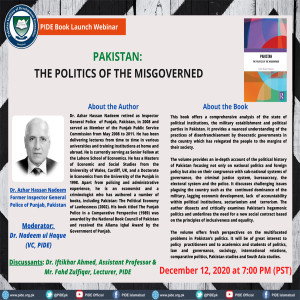
Saturday Dec 12, 2020
Pakistan: The Politics of the Misgoverned
Saturday Dec 12, 2020
Saturday Dec 12, 2020
This book offers a comprehensive analysis of the state of political institutions, the military establishment and political parties in Pakistan. It provides a nuanced understanding of the practices of disenfranchisement by theocratic governments in the country which has relegated the people to the margins of their society.
The volume provides an in-depth account of the political history of Pakistan focusing not only on national politics and foreign policy but also on their congruence with sub-national systems of governance, the criminal justice system, bureaucracy, the electoral system and the police. It discusses challenging issues plaguing the country such as the continued dominance of the military, lagging economic development, lack of accountability within political institutions, sectarianism and terrorism. The author dissects and critically examines Pakistan’s hegemonic politics and underlines the need for a new social contract based on the principles of inclusiveness and equality.
The volume offers fresh perspectives on the multifaceted problems in Pakistan’s politics. It will be of great interest to policy practitioners and to academics and students of politics, law and governance, sociology, international relations, comparative politics, Pakistan studies and South Asia studies.
About Author:
Dr. Azhar Hassan Nadeem retired as Inspector General Police of Punjab, Pakistan, in 2008 and served as Member of the Punjab Public Service Commission from May 2008 to 2011. He has been delivering lectures from time to time in various universities and training institutions at home and abroad. He is currently serving as Senior Fellow at the Lahore School of Economics. He has a Masters of Economic and Social Studies from the University of Wales, Cardiff, UK, and a Doctorate in Economics from the University of the Punjab in 1998. Apart from policing and administrative experience, he is an economist and a criminologist who has authored a number of books, including Pakistan: The Political Economy of Lawlessness (2002). His book titled The Punjab Police in a Comparative Perspective (1989) was awarded by the National Book Council of Pakistan and received the Allama Iqbal Award by the Government of Punjab.
Event Flyer
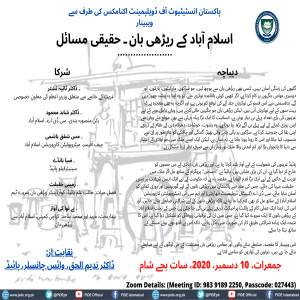
Friday Dec 11, 2020
Street Vendors in Islamabad – Voice from the Ground
Friday Dec 11, 2020
Friday Dec 11, 2020
ife on streets is not easy. Ask any street vendor on the roads, markets, parks and other public spaces in Islamabad. Given option of a regular job, majority of street vendors will quit their vocation. Unfortunately, these job offerings are not expected to arrive soon. And even, miraculously jobs are created for many, then more from poorer segments will be entering in the public space to fill the vending spots vacated by others. It is an avalanche of humanity that is seeping in through any space for making their livelihood. They work through the system by bribing, cajoling or guiling in their existential struggle. It is easy to bemoan the congestion, unhygienic and slyness, often attributed to the vendors on the streets, but difficult to wish them away in the fifth most populous low-income country.
PIDE has been raising the voice for the inclusion of the poor. And street vendors remain a potent manifestation of these excluded segments. PIDE has rolled up its sleeves by teaming up with Ehsaas, the premier poverty alleviation initiative in the country. Purpose is to establish an evidence-based support for the government to streamline governance and livelihood of street vendors in Pakistan. It is also coordinating with Capital Development Authority (CDA) and Metropolitan Corporation Islamabad (MCI) for collaborative regulation of Street Vendors. And it has also ventured in action through a pilot project, whereby it has conducted the first street vendors’ survey in Islamabad on their profile development. It is resulting in a more participatory approach for a strive to resolve this intractable issue.
This webinar is mean to present the voice from the ground of both regulators and regulatees of local street economy.
- Sania Nishtar; Special Assistant to Prime Minister on Poverty Alleviation
- Shahid Mahmood; Member, Planning, Capital Development Authority (CDA)
- Shafaq Hashmi; Chief Officer, Metropolitan Corporation Islamabad (MCI)
- Zia Banday; Senior Fellow, PIDE (Presentation on the findings of Street Vendors’ Survey in Islamabad)
- Exposure on Ground; Fazal Hayat, Coordinator of Street Vendors’ Survey Team
- Voice of the Unheard; Bedar Bakht & Muhammad Sajid, Street Vendors from Karachi Company, Islamabad
Moderator: Dr. Nadeem-ul-Haque, Vice Chancellor, PIDE
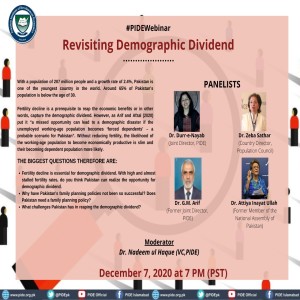
Thursday Dec 10, 2020
Revisiting Demographic Dividend
Thursday Dec 10, 2020
Thursday Dec 10, 2020
- Sania Nishtar; Special Assistant to Prime Minister on Poverty Alleviation
- Shahid Mahmood; Member, Planning, Capital Development Authority (CDA)
- Shafaq Hashmi; Chief Officer, Metropolitan Corporation Islamabad (MCI)
- Zia Banday; Senior Fellow, PIDE (Presentation on the findings of Street Vendors’ Survey in Islamabad)
- Exposure on Ground; Fazal Hayat, Coordinator of Street Vendors’ Survey Team
- Voice of the Unheard; Bedar Bakht & Muhammad Sajid, Street Vendors from Karachi Company, Islamabad
Panelist
Dr. Durr-e-Nayab
Dr. Zeba Sathar
Dr. G.M.Arif
Dr. Attiya InayatUllah
Moderator: Dr. Nadeem-ul-Haque, Vice Chancellor, PIDE

Thursday Dec 03, 2020
Energy efficiency and conservation in Pakistan.m4a
Thursday Dec 03, 2020
Thursday Dec 03, 2020
For further details, please follow us on Facebook, Twitter, LinkedIn and YouTube on the following links. Facebook: https://www.facebook.com/PIDEIslamabad YouTube: https://www.youtube.com/channel/UCq83tF7h2-bILURlB4wt5-A/videos Twitter: https://twitter.com/pidepk?lang=en LinkedIn: https://www.linkedin.com/in/pakistan-institute-of-development-economics-pide-5279981a4 Blogs: https://pide.org.pk/blog/ Website: www.pide.org.pk

Friday Nov 27, 2020
The C-Section Epidemic in Pakistan.m4a
Friday Nov 27, 2020
Friday Nov 27, 2020
For further details, please follow us on Facebook, Twitter, LinkedIn and YouTube on the following links. Facebook: https://www.facebook.com/PIDEIslamabad YouTube: https://www.youtube.com/channel/UCq83tF7h2-bILURlB4wt5-A/videos Twitter: https://twitter.com/pidepk?lang=en LinkedIn: https://www.linkedin.com/in/pakistan-institute-of-development-economics-pide-5279981a4 Blogs: https://pide.org.pk/blog/ Website: www.pide.org.pk

Friday Nov 20, 2020
Doing Ethnography in the Times of COVID-19.m4a
Friday Nov 20, 2020
Friday Nov 20, 2020
For further details, please follow us on Facebook, Twitter, LinkedIn and YouTube on the following links. Facebook: https://www.facebook.com/PIDEIslamabad YouTube: https://www.youtube.com/channel/UCq83tF7h2-bILURlB4wt5-A/videos Twitter: https://twitter.com/pidepk?lang=en LinkedIn: https://www.linkedin.com/in/pakistan-institute-of-development-economics-pide-5279981a4 Blogs: https://pide.org.pk/blog/ Website: www.pide.org.pk

Thursday Nov 19, 2020
Idleness & Mental Health Problems - Challenge to Pakistan's Demographic Dividend.m4a
Thursday Nov 19, 2020
Thursday Nov 19, 2020
For further details, please follow us on Facebook, Twitter, LinkedIn and YouTube on the following links. Facebook: https://www.facebook.com/PIDEIslamabad YouTube: https://www.youtube.com/channel/UCq83tF7h2-bILURlB4wt5-A/videos Twitter: https://twitter.com/pidepk?lang=en LinkedIn: https://www.linkedin.com/in/pakistan-institute-of-development-economics-pide-5279981a4 Blogs: https://pide.org.pk/blog/ Website: www.pide.org.pk

Wednesday Nov 18, 2020
Pakistan Railways or Pakistan's Railways - PIDEWEBINAR.m4a
Wednesday Nov 18, 2020
Wednesday Nov 18, 2020
For further details, please follow us on Facebook, Twitter, LinkedIn and YouTube on the following links. Facebook: https://www.facebook.com/PIDEIslamabad YouTube: https://www.youtube.com/channel/UCq83tF7h2-bILURlB4wt5-A/videos Twitter: https://twitter.com/pidepk?lang=en LinkedIn: https://www.linkedin.com/in/pakistan-institute-of-development-economics-pide-5279981a4 Blogs: https://pide.org.pk/blog/ Website: www.pide.org.pk
